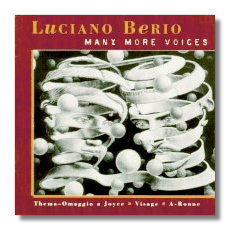
The Internet's Premier Classical Music Source
Related Links
- Berio Reviews
- Latest Reviews
- More Reviews
-
By Composer
-
Collections
DVD & Blu-ray
Books
Concert Reviews
Articles/Interviews
Software
Audio
Search Amazon
Recommended Links
Site News
 CD Review
CD Review
Luciano Berio

Many More Voices
- Thema - (Omaggio a Joyce)
- Visage
- A-Ronne
Cathy Berberian, mezzo-soprano
Nelly Frijda, Ileana Melitta, Hans Karsenbarg,
Henk Reijn, and Hans Veerman, actors
RCA Victor Red Seal 09026-68302-2 ADD 61:03
Although times are hard in the classical recording industry, it is good to know that a major label still can see fit to release good, daring material. Mendelssohn this ain't.
It would hardly be stretching a point to state that these three pieces have little to do with music at all, unless one considers language itself a form of music, an assertion that certainly would find support with Luciano Berio. Each of these works plays with the human voice and communication in different ways. Thema - (Omaggio a Joyce) begins with the late Cathy Berberian (and the erstwhile Signora Berio) reading a passage from Ulysses. Two minutes into the work, Berio begins deconstructing her voice through a variety of electronic manipulations. Joyce's text is intrinsically musical, in the sense that it has rhythm, tone color, and a melody of sorts. Berio's manipulations uncover (or perhaps overlay) a second stratum of music that complements the first, even when these manipulations produce something like the chattering of an irate chipmunk. Stereophonic effects make Berberian's voice, or mutated fragments thereof, dart between one's ears. At eight minutes, the experiment is too short to be conclusive, but it is attractive nevertheless, if you are open-minded.
The notorious Visage should be a misogynist's delight. Here, Berberian has no recognizable words at all (except for one - parole - which is Italian for "words"). What she does have, however, is an almost operatic scena comprised of moans, shouts, whimpers, cries, and peals of lascivious laughter. At times, she attempts to narrate a story, or describe some disaster that has befallen her, but the language she has been given is not one known to man, although its inflections may fool one into thinking otherwise. Berberian has to contend with an array of electronic sounds, and most of them are not particularly friendly. The most frightening moment in Visage is when, at the peak of a passage of increasingly abject terror, Berberian's anguished whine jump-cuts (completely without the aid of electronics, I believe) into a crude burst of laughter. Do not play Visage with the windows open, or the neighbors probably will suspect you of sexual assault and call the authorities. It's that horrifying.
A-Ronne (approximately, "A to Z") is a "documentary" for five actors. The subject of this "documentary" is a poem by Edoardo Sanguineti, which in turn incorporates excerpts from the Communist Manifesto, the writings of Roland Barthes, and others. The actors recite the poem about twenty times, but the words are mere scaffolds upon which Berio hangs inflections associated with stereotyped dramatic scenarios: a hospital scene, a love scene, a television news program, and so on. In spite of its high potential for coming across as pretentious nonsense, I find A-Ronne inventive and amusing overall. At 30 minutes, though, it goes on well after one gets its point.
Thema and this 1974 recording of A-Ronne are receiving their first release with this disc. (A-Ronne was recorded by the Swingle II in 1976, but the CD release seems to have been withdrawn. At any rate, Swingle II's performance is more technically polished than the one offered here, although this Dutch one is rawer and generally more dramatic, so I prefer it by a slim margin.) All three performances benefit from recent restoration and 'denoising" of the original tapes. If you listen with headphones, you will hear some pre- and post-echo, and in Visage, Berberian's voice fades into the electronic maelstrom more than I remember from previous issues of this performance.
Berio is an imp of provocation, and Berberian can do anything with her remarkable voice and histrionic talents. Give this disc a try if you want to be charmed with one hand and ruffled with the other.
Copyright © 1999, Raymond Tuttle












